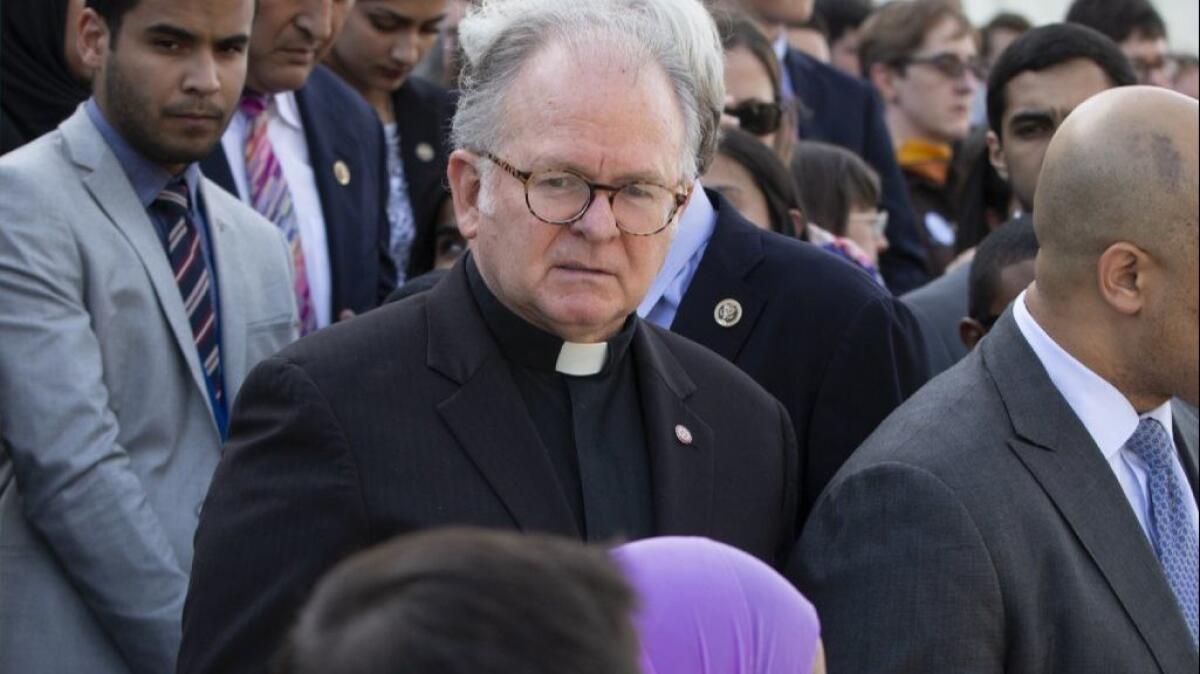Opinion: Paul Ryan, the chaplain and a crack in interfaith conservatism

- Share via
“The Protestants hate the Catholics, and the Catholics hate the Protestants … ”
— Tom Lehrer, “National Brotherhood Week”
When I saw Lehrer perform that satirical classic on TV, during my Catholic childhood in the 1960s, Protestants and Catholics still didn’t get along that well, despite the election in 1960 of John F. Kennedy.
But the 1960s also saw the flowering of the ecumenical movement nurtured by the Second Vatican Council. Aside from encouraging outreach to “separated brethren,” Vatican II launched reforms that led to the Mass being said in English, which made Catholicism seem less like a “foreign” faith to American Protestants.
Among Catholics, ecumenism was considered a “liberal” project. But by the 1990s, a new sort of right-wing ecumenism had emerged in the United States as politically conservative Catholics joined forces with like-minded evangelical Protestants, initially in opposing abortion.
A milestone in this rapprochement was a 1994 document called “Evangelicals and Catholics Together” that was signed by, among others, two Catholic bishops and luminaries from the Southern Baptist Convention. It said that disagreements between Catholics and Protestants over doctrine “must not be permitted to overshadow the truths on which we are, by the grace of God, in firm agreement.” One of the principles on which the signatories agreed was “a free society, including a vibrant market economy.”
But some cracks in the conservative evangelical-Catholic alliance — at least in its Washington version — appeared recently in the controversy over Speaker of the House Paul D. Ryan’s decision to fire the House chaplain, a Jesuit priest.
On Thursday, Ryan reversed course and said he was happy to have the Rev. Patrick Conroy remain as chaplain after the priest retracted his “resignation.” In a feisty letter, Conroy disputed Ryan’s explanation for letting him go — that members “felt like the pastoral services were not being adequately served, or offered.”
For good measure, Conroy fingered Ryan’s chief of staff, Jonathan Burks, as the source for a different motivation. “Mr. Burks mentioned dismissively something like ‘maybe it’s time we had a chaplain that wasn’t Catholic.’ He also mentioned my November prayer and an interview with the National Journal Daily.” (Burks disputed Conroy’s recollection of their conversation.)
The “November prayer” was the prayer Conroy delivered on Nov. 6 as members were preparing to act on a Republican tax-reform bill. It contained this plea: “May their efforts these days guarantee that there are not winners and losers under new tax laws, but benefits balanced and shared by all Americans.”
Not exactly liberation theology, but Ryan was reportedly not amused. According to Conroy, the speaker told him: “Padre, you just got to stay out of politics.”
That makes it sound as if the dispute that led to Conroy’s sacking was political, not religious (and, anyway, Ryan himself is Catholic).
But after Conroy’s resignation was announced, an uglier subtext surfaced: Apparently some Protestant House Republicans didn’t like the idea of being ministered to by a Catholic priest.
According to the New York Times, the chaplain controversy “exposed long-simmering tensions between Roman Catholics and evangelical Christians over who should be the lawmakers’ religious counselor.” Its story noted that after Ryan forced Conroy out, “Rep. Mark Walker, Republican of North Carolina and a Southern Baptist minister, suggested that the next chaplain should be a family man — a remark that caused upset among Catholics because it implied that Catholic priests, who take a vow of celibacy, would not be eligible.” (Walker’s spokesman said the congressman “was not excluding any faith or denomination and that these traits were not qualifications.”)
In a syndicated column, the married journalists Cokie Roberts and Steven V. Roberts wrote: “Terminating Father Conroy unveiled an ugly strain of anti-Catholicism infecting some House Republicans.”
No one likes religious prejudice, and we’re better off if the Protestants don’t hate the Catholics and the Catholics don’t hate the Protestants. And, in fact, anti-Catholic prejudice has declined dramatically in my lifetime. Yet a residue of ignorance (or worse) about Catholicism does exist among some evangelical Protestants, including politically active ones. Conservative Catholics who cozied up to them because of a common political faith need to be reminded of that from time to time.
Follow the Opinion section on Twitter @latimesopinion and Facebook
More to Read
A cure for the common opinion
Get thought-provoking perspectives with our weekly newsletter.
You may occasionally receive promotional content from the Los Angeles Times.











